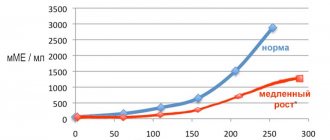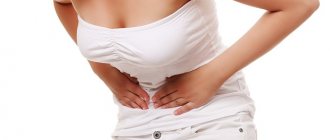It is difficult to imagine greater happiness in a woman’s life than the happiness of being a mother. Having learned about an interesting situation, a woman literally begins to glow from within. Most often, the negative manifestations of pregnancy in the form of lethargy, drowsiness, dizziness do not frighten or upset the fair sex. Sometimes a woman suffers from toxicosis for all 9 months. And here it is simply impossible not to notice nausea and vomiting. Why do you feel sick during pregnancy?
? How to relieve toxicosis?
Nausea problem
Most mothers experience nausea in the first trimester in the morning after eating or immediately after getting out of bed. This is a rather unpleasant sensation that significantly complicates the life of a new mother. It’s especially offensive when you feel sick after dishes that were previously your favorite. Moreover, nausea during pregnancy does not come alone, it is usually accompanied by terrible migraines, and sudden movements constantly make you feel nauseous, and sometimes even vomit.
On such days, it becomes a discovery that the husband’s favorite and pleasant perfume for a woman has simply begun to stink terribly, and the smells from the kitchen simply cause violent disgust. Every day exposes mommy, and especially her stomach, to serious tests. The worst thing is that such toxic conditions with nausea after eating and regardless of it can last until the second trimester, or even until childbirth.
Nausea in the evening, when a woman is already exhausted by daytime ailments, is no less disgusting. Experts say that in the evening, pregnant women experience nausea due to fatigue and overwork. Especially often in the evenings after eating in the first trimester of pregnancy, a nauseating reaction occurs if the girl did not eat anything during the day. Therefore, an important condition for successful gestation is the correct organization of the regime and diet.
Conclusion
If nausea occurs during pregnancy, it is recommended to direct all efforts to improve the health of the body. To do this, the pregnant woman must be in comfortable conditions and eat her favorite foods. This will make it much easier to get through the difficult period. The daily routine must include walks in the fresh air and naps during the day. Drug treatment is prescribed only if a woman begins to rapidly lose weight. As a rule, the negative manifestation will completely go away before the beginning of the second trimester.
Causes of nausea
Many mothers are perplexed why their own baby, growing in its own belly and sharing the same nutrition and blood flow with the mother, causes so much trouble during pregnancy. But you can’t fool the body. Already in the very first days after implantation, he recognizes a foreign body in the fertilized egg, because the baby got ½ of the chromosomes from the father and the same amount from the mother.
You must follow all the recommendations and advice of doctors
To stabilize the condition of the maternal body, active secretion of hormonal substances such as progesterone, prolactin hormone and others occurs. The main task of these substances is to maintain and preserve pregnancy and prevent miscarriage. It is these hormonal changes that cause nausea, migraines and vomiting.
Doctors have not yet found a definite answer explaining why patients felt sick during pregnancy. It has simply not yet been possible to scientifically substantiate why the first trimester of pregnancy is accompanied by nausea and vomiting. It is also not clear what specifically affects the frequency and intensity of toxic symptoms in the first weeks of gestation.
One of the factors causing nausea reactions is a lack of B6. Experts suggest that it is precisely because of this that mothers feel sick, since this vitamin substance is necessary for the formation of blood cells, chemicals for the fetus and antibodies. Many pregnant women in the early stages of gestation experience severe migraines and nausea resulting from headaches. And migraines themselves occur against a background of anxiety, psycho-emotional experiences and stress.
How severe toxicosis will be depends on the factors that caused it, as well as on the individual characteristics of the body. Some factors, for example, only increase the severity of nausea. These include:
- Digestive problems and disorders of the digestive tract;
- Not a particularly efficient state of endocrine structures;
- Weakened immune defense;
- Hyperacid or hypoacid reactions in the stomach;
- Weakened nervous system;
- Hereditary factors.
These disorders are often detected before conception, but getting rid of them is not so easy. Although preventive measures can be taken to minimize the negative effect of such deviations during gestation.
Additional factors
Another reason that provokes nausea in the first gestational stage is an increase in estrogen and progesterone hormonal substances. The highest estrogen peak is observed in the first trimester of pregnancy. It is at this time that toxicosis occurs, and it begins in each patient at different times and lasts for different periods of time. There are no specific time limits.
Moreover, the hormonal surge in the first trimester also affects the olfactory structures, so taste preferences change, and once-favorite aromas begin to make you feel sick, the contents of the stomach ask to come out. In addition, progesterone hormone slows down the digestive processes, which also contributes to ailments.
In order to somehow minimize toxic manifestations, it is worth taking care of the prevention of ailments. If a mother knows even before conception that she has a low immune status, then it is necessary to strengthen it by taking vitamin complexes. Then the nauseating ailments that arise will not bother you so much.
Manifestations of a nausea reaction
If you feel unwell, you should not self-medicate
Typically, nausea symptoms after eating begin to appear around the third week of gestation, but in the first days after implantation, a woman can also feel noticeably nauseous. There are no clear dates defining the beginning and end of toxic nausea during pregnancy, although most often it bothers pregnant women at 3-12 weeks. Sometimes in the first months, pregnancy proceeds smoothly, without toxicosis, but in the second trimester, ailments begin.
Nausea symptoms are most severe in the morning, after getting out of bed or after breakfast. A woman can begin to feel nauseous for any reason: food smells, sudden movements, etc. It is not at all necessary that nausea occurs after food; some mothers experienced the urge at the sound of their own husband’s voice. Usually, nausea passes quickly enough, ending with natural vomiting or without it.
Many experts are of the opinion that nausea is beneficial for a pregnant woman; it helps the expectant mother understand which foods or aromas are useful and pleasant for the baby, and which are not welcome. Yes, sometimes the body’s preferences are quite strange, but it knows better. Unfortunately, along with breakfast, the body is deprived of useful microelements and vitamins that are necessary for the baby.
Poisoning during pregnancy
In case of poisoning, a pregnant woman experiences symptoms:
- Loose stools;
- Nausea, vomiting;
- Temperature;
- Headache.
A woman feels unwell for one to three days. An intestinal infection is also dangerous for a child. Toxins penetrate the mother's blood into the placenta. Food poisoning harms both. When vomiting, the body gets rid of toxins, and gastrointestinal functions are soon restored. Dehydration can be stopped with the drug rehydron after the urge to vomit has stopped.
Symptoms requiring medical intervention
If the mother begins to feel sick frequently, it is necessary to inform the specialist about this at the next scheduled appointment. The doctor will assess the degree of toxicosis and the need for hospitalization.
- If nausea and vomiting reactions do not bother you more than 5 times a day, then you should not specifically contact a gynecologist with this problem.
- If nausea and vomiting reactions occur 10 times or more often, accompanied by dizziness and hyperthermia, diarrhea and apathy, then contacting an obstetrician-gynecologist should be done immediately.
- If, during pregnancy, a patient unexpectedly develops diarrhea, hyperthermia and general weakness in addition to nausea and usual ailments, then such symptoms indicate intoxication. Such conditions can harm the baby and require immediate medical attention.
- Also a suspicious symptom is the sudden disappearance of nausea, because such a sign may indicate fetal fading. When the baby stops developing, pregnancy hormones are not synthesized, so they no longer affect the body. Hence the absence of nausea, headaches and other ailments. This condition requires special attention at 7-10 weeks, since at this time you should feel quite sick.
- If nausea and vomiting after eating are accompanied by spotting and dizziness in the first trimester, then there is a high probability that the woman has an ectopic pregnancy with ectopic implantation of the fertilized egg. In this situation, emergency assistance from specialists is needed.
- If nausea symptoms are accompanied by hyperthermic reactions with readings of 38-39°C and diarrhea, then this sometimes indicates infectious processes in the patient’s body. To avoid adverse consequences, it is necessary to cure the pathology as soon as possible.
- If the symptoms of nausea and vomiting are supplemented by the presence of bloody impurities in the vomit, then such manifestations may indicate gastric diseases. Therapy is also necessary here, otherwise the baby will not have enough incoming substances and minerals, since the digestive processes are seriously impaired.
Any suspicious symptoms accompanying toxicosis require mandatory medical intervention. This is necessary to avoid serious complications.
Types of pain during pregnancy
An ordinary person cannot always cope with pain, having the opportunity to undergo prescribed procedures and take medications. What can we say about a pregnant woman, when her head is filled with thoughts about home, work, a child, and then her stomach hurts. Internal organs change location due to the enlarged uterus and are forced to work abnormally.
Symptoms of pain indicate an exacerbation of a chronic or acquired disease. When carrying a baby, a woman suffers, for example, from gastritis. She feels full, her stomach becomes tense and heavy. These signs appear in women with other diseases: cholecystitis, biliary dyskinesia, pancreatitis, and so on.
Displacement of the uterus in the second half of pregnancy changes the usual course of food. The bolus of food is compressed, which causes gastric juice to reflux into the upper esophagus. The process is accompanied by bitterness in the mouth and other unpleasant sensations.
At week 4, the fetus puts pressure on joints, muscles, and ligaments. If the pain radiates to the stomach, accompanied by chills with vomiting and nausea, you should consult a doctor. The fourth week of pregnancy is a time when it is easy to lose your baby.
At the 7th month of pregnancy, heaviness is felt in the lower back and abdomen due to stretching of the muscular-ligamentous apparatus. The uterus begins to prepare for childbirth: false contractions can be easily distinguished from real ones by their painlessness. If a spasm occurs in the abdomen during the 8th month of gestation, consult a doctor immediately, as the placenta may detach. Drawing, cutting, spastic pain in any month is a reason to be wary.
How does pain manifest itself?
Gastric spasm in the peri-umbilical region indicates an inflammatory-dystrophic change in the gastric mucosa. Gastritis can be accompanied by colitis and inflammation of the duodenum. The pain is dull and prolonged. Ulcerative processes cause sharp short-term attacks with indomitable cramp-like pain.
In order for a doctor to diagnose the disease and prescribe adequate treatment, a woman needs to track what and when she ate. Pain during gastritis differs from pain perception during cholecystitis. A stomach ulcer will manifest itself within an hour and a half from the start of eating. A duodenal ulcer will respond within no later than two hours.
If the stomach hurts before eating, the woman probably developed duodenitis or a duodenal ulcer during pregnancy. Foods containing acid – pickled vegetables, canned food – provoke colic in the stomach. Uncontrollable pain occurs with the consumption of coarse fibers, cellulose, and grain bread.
Elimination methods
The best rest is in the fresh air
If nausea after eating bothers you literally after every meal, then the girl is already afraid to eat and tries to refuse food once again, which is absolutely unacceptable. The body should absolutely not starve during pregnancy. You need to eat little and often. It is recommended to put a glass of water and an apple on the bedside table in the evening. If you have breakfast with an apple right in bed, then after eating you will no longer be bothered by nausea.
After dinner, mommy may feel sick if she was too tired during the day, was stressed, or didn’t eat anything at all all day. What to do in such a case? You should try to avoid stressful situations, not take work troubles too seriously, be sure to have a snack and rest at lunchtime.
Also, walking in the fresh air, lemon tea or mineral water, valerian or mint infusions, etc. will help to significantly reduce the manifestations of nausea. Experts also recommend that the room in which the mother works, rests, sleeps should be ventilated several times a day.
Eating protein foods such as eggs, cheese and fermented milk products, as well as carbohydrate foods, helps overcome nausea in the morning. An excellent remedy for ailments during pregnancy is to exclude hot or overly spicy, fatty or heavy foods from the diet. Experts also recommend avoiding all foods that provoke a feeling of nausea, such as unpleasant foods or smells, etc. Usually, nausea reactions do not require special therapy and go away on their own after a certain time. Sometimes nausea occurs after breakfast, and the next day after an evening meal.
If toxicosis develops to a sufficiently severe degree, the doctor prescribes drug treatment. Typically, indications for such treatment of toxicosis are frequent vomiting reactions, detection of acetone in urine tests, rapid weight loss of a pregnant woman and frequent fainting due to a weakening of the body. Also, an indication for drug treatment of toxicosis is general discomfort, which interferes with leading a normal lifestyle, working and even performing simple household duties.
Complete indifference to surrounding events, severe apathy or drowsiness, complete lack of appetite and pallor of the skin - all this is also considered alarming symptoms that require drug treatment. Therapy is also required in the presence of hyperthermic reactions, the smell of acetone from the mouth, bruises around the eyes and a gray coating on the surface of the tongue.
Anti-nausea medications
Toxicosis is one of the rather unpleasant periods of a girl’s life, however, almost no one can avoid it. Sometimes mothers are lucky and do not experience such unpleasant sensations. But still, more often than not, toxicosis is an integral part of the life of every pregnant woman.
- If problems with toxicosis are quite severe, pregnant women are prescribed Cerucal. This is a fairly common antiemetic drug that effectively relieves attacks of nausea. But on the other hand, it can provoke placental abruption and cause spontaneous abortion. Moreover, Cerucal can provoke placental abruption and even spontaneous abortion. But this remedy also has a downside - it provokes an increase in muscle activity, and therefore can provoke placental abruption and miscarriage. Moreover, the use of Cerucal by pregnant women often leads to bradycardia, allergies or hypotension.
- Also, for severe nausea after eating, causing severe exhaustion of pregnancy, experts recommend Regidron. Since dehydration develops with vomiting reactions, this remedy will help mommy cope with the problem perfectly. It is enough to make a solution from the powder for internal use and drink it. The contents of 1 sachet are sufficient for one liter of warm boiled water.
- The enzyme drug Motilium is also prescribed for nausea after eating in the first months of pregnancy, which relieves severe attacks of malaise and normalizes digestive motility. It has antiemetic and antinausea effects and blocks dopamine receptors. It can cause increased blood pressure and therefore requires medical prescription.
- Polyphepan is also often prescribed for severe toxicosis with a strong nausea reaction. The drug is an enterosorbent, helps with diarrhea and nausea-vomiting attacks, and provides a detoxification effect. You should drink it about 60 minutes before meals. Self-prescription is unacceptable, only as prescribed by a specialist.
In order not to suffer from acute ailments during pregnancy, it is necessary to competently prepare for such an important period. Only careful planning of conception will help avoid the unpleasant surprises that so often accompany pregnancy. You definitely need to diversify your diet, not get carried away with physical activity, and avoid worries. Nauseous attacks occur in almost all patients, but if you take appropriate measures and follow obstetric recommendations, you can easily overcome the toxic stage of pregnancy, fully enjoying your upcoming motherhood.









